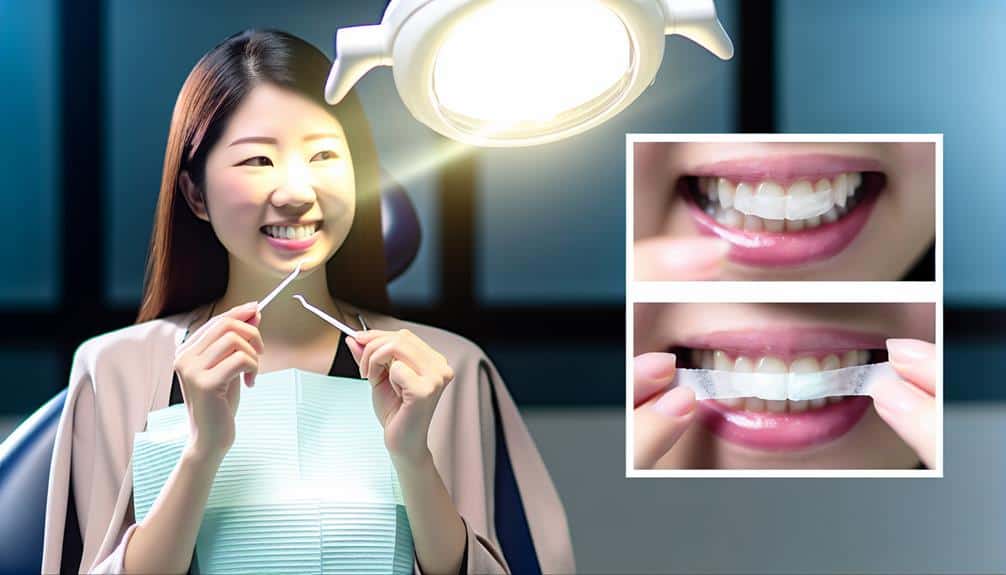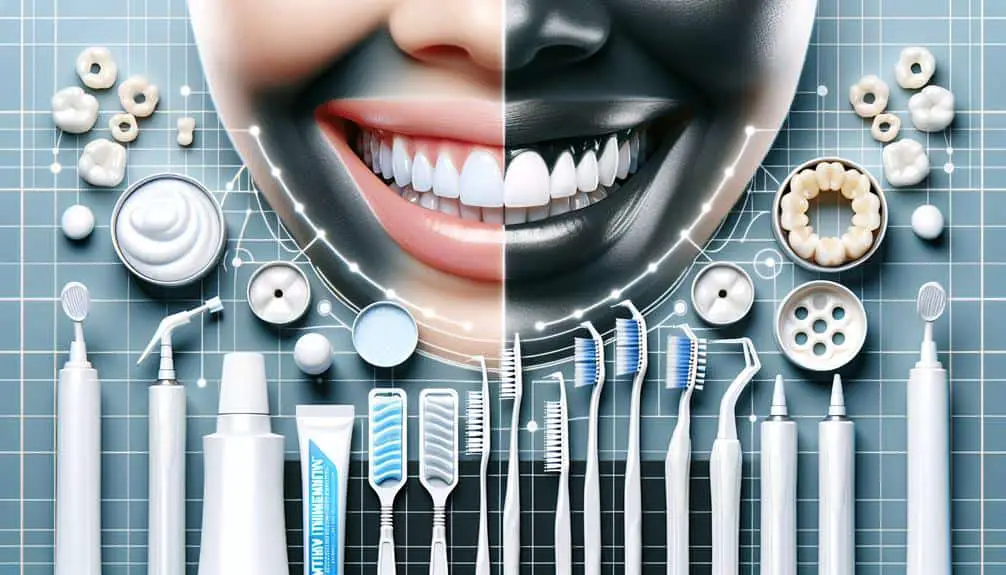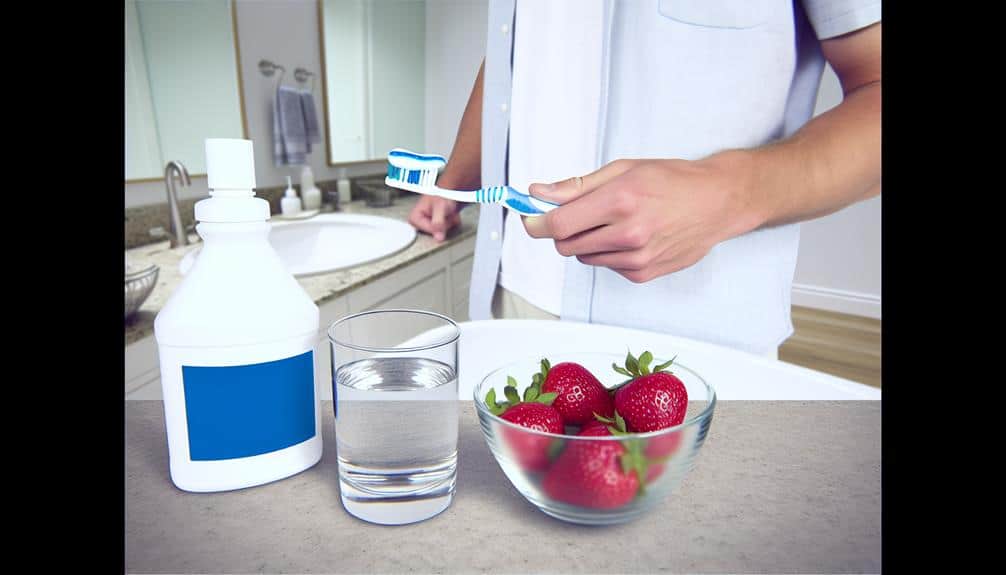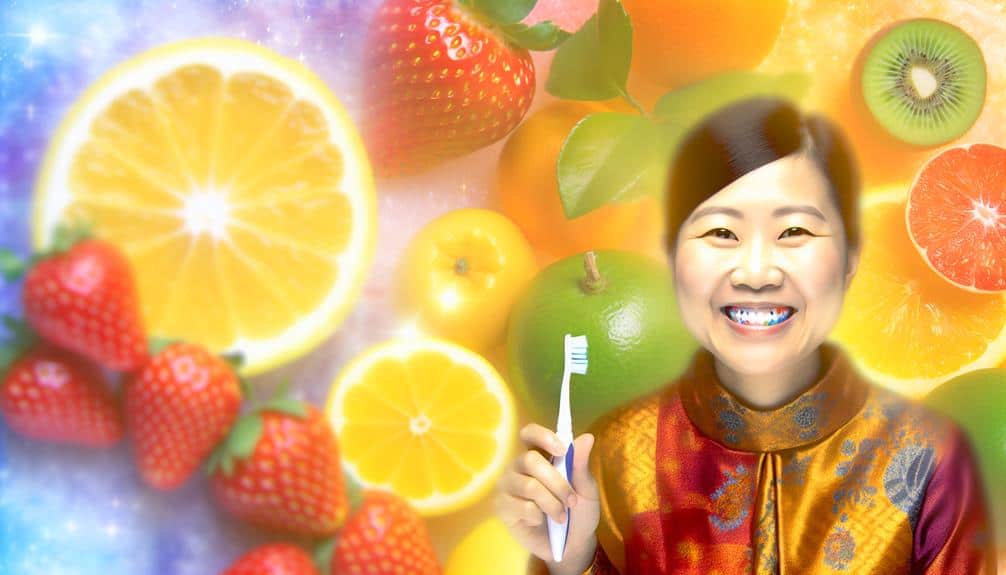For a brighter smile, consider professional whitening treatments offered by certified dentists, like laser therapy that activates hydrogen peroxide for quick results. At-home kits with whitening strips and LED devices are convenient options. You can also explore natural remedies such as using baking soda or activated charcoal. Lifestyle changes like rinsing after consuming staining foods and maintaining good oral hygiene also help in preventing discoloration. Remember, these methods are just the beginning to achieving whiter teeth.
Key Points
- Consult a dentist for professional whitening treatments like laser therapy for safe and effective results.
- Use at-home whitening kits with hydrogen peroxide or LED devices for convenient and cost-effective whitening.
- Try natural remedies like baking soda, activated charcoal, oil pulling, or fruit peels for a safe and affordable option.
- Maintain a bright smile by watching dietary habits, practicing good oral hygiene, and avoiding staining substances.
- Regular dental cleanings, healthy habits, and dental check-ups help prevent discoloration and maintain a white smile.
Professional Whitening Treatments
For professional whitening treatments, consult with a certified dentist to determine the most appropriate option for achieving your desired results. A dental office offers various advanced methods for whitening teeth, with one popular technique being laser treatment. Laser teeth whitening is a safe and effective procedure that can greatly improve the color of your teeth in just one visit.
During a laser treatment session at a dental office, a protective barrier is applied to your gums to protect them from the laser. The dentist then applies a hydrogen peroxide solution to your teeth, which the laser activates to speed up the whitening process. The laser light enhances the penetration of the whitening agent into the enamel, breaking down stains and discoloration effectively.
Laser teeth whitening in a dental office is known for its quick results and minimal sensitivity compared to other methods. This professional treatment ensures that the whitening process is closely monitored by a trained dental professional, leading to a brighter and more confident smile.
At-Home Whitening Kits
When considering whitening your teeth at home, exploring the efficacy of At-Home Whitening Kits can provide a convenient and cost-effective option for achieving a brighter smile. Whitening strips are a popular choice in these kits. They're easy to use and typically involve applying the strips to your teeth for a set amount of time each day. These strips often contain a whitening agent like hydrogen peroxide to help remove stains and discoloration.
Another option found in At-Home Whitening Kits is LED devices. These devices emit a specific type of light that activates the whitening gel applied to the teeth. The light helps accelerate the whitening process, providing potentially quicker results compared to strips alone. LED devices are often user-friendly and can be a good choice for those looking for a more advanced at-home whitening option.
Before using any At-Home Whitening Kits, it's crucial to follow the instructions carefully to ensure safe and effective use. Consulting with a dentist before starting any whitening treatment can also help determine the best option for your specific needs and dental health.
Natural Remedies for Teeth Whitening
To naturally whiten your teeth, explore the efficacy of various home remedies that leverage the power of natural ingredients such as baking soda or activated charcoal. These natural remedies can be gentle on your teeth while still providing effective whitening results.
Here are four evidence-based methods for teeth whitening at home:
- Baking Soda: Baking soda has mild abrasive properties that can help scrub away surface stains on your teeth.
- Activated Charcoal: Activated charcoal is known for its ability to absorb toxins and stains, making it a popular ingredient in natural teeth whitening products.
- Oil Pulling: This ancient practice involves swishing oil around in your mouth to help remove bacteria and stains from your teeth.
- Fruit Peels: Rubbing orange, lemon, or banana peels on your teeth can help whiten them due to the natural acids and enzymes present in the peels.
These natural remedies offer a safe and cost-effective way to enhance the brightness of your smile without harsh chemicals.
Lifestyle Changes to Prevent Tooth Discoloration
Explore lifestyle changes that can help prevent tooth discoloration and maintain a bright smile naturally. Your dietary habits play a significant role in the color of your teeth. Consuming foods and drinks that are known to stain teeth, such as coffee, tea, red wine, and dark berries, can lead to discoloration over time. To prevent this, try to limit your intake of these items and rinse your mouth with water after consuming them. Additionally, maintaining good oral hygiene by brushing your teeth at least twice a day and flossing regularly can help prevent plaque buildup, which can contribute to discoloration.
Tobacco use is a major culprit when it comes to tooth discoloration. The chemicals in tobacco products can lead to yellow or brown stains on your teeth. If you smoke or use other tobacco products, quitting can't only improve your overall health but also help keep your teeth looking bright. Similarly, excessive consumption of caffeine can also cause teeth to become discolored. Being mindful of your tobacco use and caffeine consumption can go a long way in maintaining a white smile.
Maintaining a Bright Smile
For maintaining a bright smile, incorporating regular dental cleanings into your oral care routine is essential. These cleanings help remove plaque and tartar buildup, preventing stains and keeping your teeth looking their best.
In addition to professional cleanings, there are several key factors to bear in mind for maintaining a bright smile:
- Healthy Dietary Habits: Consuming foods high in sugar and acids can contribute to tooth discoloration. Opt for a balanced diet rich in fruits, vegetables, and lean proteins to support overall oral health.
- Consistent Oral Hygiene: Brushing your teeth at least twice a day and flossing daily are important for preventing staining and maintaining a bright smile. Proper oral hygiene helps remove surface stains and plaque buildup.
- Regular Dental Check-ups: Schedule routine dental visits every six months for professional cleanings and examinations. Your dentist can identify early signs of discoloration and provide personalized recommendations for maintaining a bright, white smile.
- Moderating Staining Substances: Limit consumption of coffee, tea, red wine, and tobacco, as these substances can lead to tooth discoloration over time. If you do consume them, rinse your mouth with water afterward to help reduce their staining effects.
Frequently Asked Questions
Are There Any Long-Term Side Effects of Teeth Whitening Treatments?
When considering teeth whitening, be mindful of potential long-term risks. Assess the treatment's effectiveness, costs, and required maintenance. Prioritize your oral health and consult a professional to make an informed decision.
Can Teeth Whitening Cause Tooth Sensitivity?
Feeling pain when you indulge in hot or cold drinks? Tooth sensitivity might be the culprit post whitening. Prevent it by using desensitizing toothpaste prior to treatment. If sensitivity persists, consult your dentist for further advice.
Is It Safe to Use DIY Teeth Whitening Methods Found on Social Media and the Internet?
Using DIY methods from social media for teeth whitening may seem convenient, but safety and effectiveness vary. Consult a dental professional to confirm the method is safe for your teeth and gums.
How Often Should I Touch up My Teeth Whitening Treatment?
To maintain your whitening treatment's results, it's essential to touch up periodically. Touch-up frequency varies but typically every 6-12 months. Consistent oral hygiene, avoiding stain-causing foods, and professional cleanings enhance effectiveness for long-lasting brightness.
Can Certain Foods and Drinks Affect the Results of Teeth Whitening Treatments?
Certain foods and drinks, like coffee and red wine, can impact the results of teeth whitening treatments. Their pigments can stain teeth, affecting outcomes. It's advisable to limit consumption of such items to maintain a brighter smile post-treatment.



